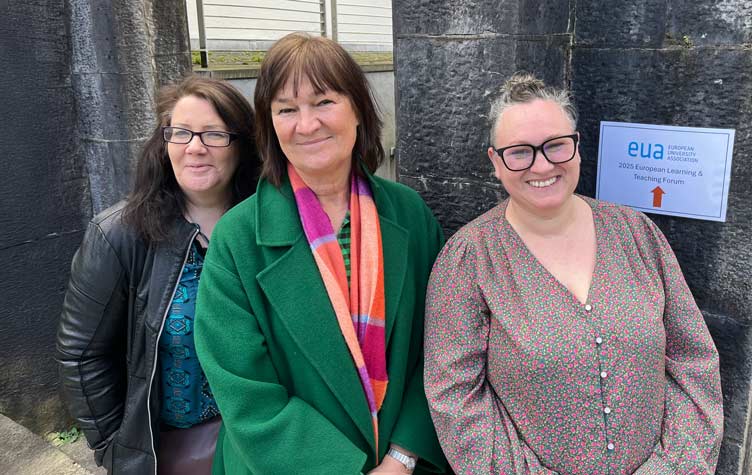RCSI students are far from passive learners. They don’t simply provide feedback at the end of a module; instead, they are centrally involved in curriculum design.
In 2022, the university was named joint winner of the ASPIRE Excellence Award for Student Engagement, making it the first medical school in Ireland to receive this honour.
More recently, RCSI Professor of Health Professions Education Jan Illing, alongside her colleagues Catherine Bruen and Dr Helen Kelly at RCSI’s Health Professions Education Centre (HPEC), presented at the European University Association (EUA) Teaching and Learning Forum about RCSI's approach to student engagement, and how other higher education institutions could follow suit as the demand for student-university partnerships grows.
RCSI isn’t just following international best practice for teaching and learning – it is leading it, with empowering students successfully integrated into all the university’s curricula. Not only this, but student engagement is now embedded right into RCSI’s mission.
A generational shift in expectations has contributed to a growing demand for student voices to be heard, while universities are keen to support students in being more responsible for their own learning.
From the university’s perspective, student empowerment facilitates students for employment, helps develop a growth mindset, improves well-being and personal development and helps prepare students both for future roles after university and lifelong learning.
These elements are a central component of RCSI’s new medical curriculum and are embedded across all Undergraduate programmes including Pharmacy, Physiotherapy and Advanced therapeutic technologies (ATT).
All of this comes amid a rapid shift to online and hybrid learning, which was accelerated by the COVID-19 pandemic. Demographically, greater movement between countries, as well as an increasingly international student body, point to a need for RCSI to support students in having their qualifications recognised wherever they are.
Personal learning targets
Professor Illing and her colleagues recognise that lectures are not the best format for learning. Student attention starts to drop off after 10 to 15 minutes, whereas learning is enhanced and meaningful when it is more active – whether this is engaging students in discussions, getting them to present on an issue or even answering a short quiz to check understanding during the lecture.
Students at RCSI are encouraged to set their own personal learning targets, and to engage in peer-learning, reflection and reflective practice, project work, electives and student-selected options within the curriculum.
Student feedback is used not just to check teaching quality, but also to ensure that lecturers are delivering information that students can understand. Meanwhile, programmatic assessment – numerous small assessments which create an overall picture of how students are doing throughout the year – allows struggling students to be supported.
Creating dynamic graduates
At RCSI, students are also involved on committees and in the development or revision of curricula.
Professor Illing and her colleagues spoke to how students are empowered when they have a sense of belonging to the university, faculty, course and peers. RCSI personal tutors meet students regularly to support students. Another element that supports student empowerment at RCSI is equity, diversity and inclusion, so that difference is celebrated and valued.
They also explained how important it is that student engagement is active and not tokenistic, pointing to RCSI’s staff-student partnerships where collaborative work and research leads to real change.
Ultimately, a collaborative, partnership approach that involves really hearing the students leads to happier, successful and dynamic graduates that can make a real impact in the world – and that is at the heart of RCSI’s mission.
RCSI is committed to achieving a better and more sustainable future through the UN Sustainable Development Goals.
![]()
![]()


